The Pogues frontman may be better known for his wild living than anything resembling Christianity, but the rockstar who once contemplated priesthood had a genuine – if complicated – interest in the spiritual, says Tim Bechervaise.
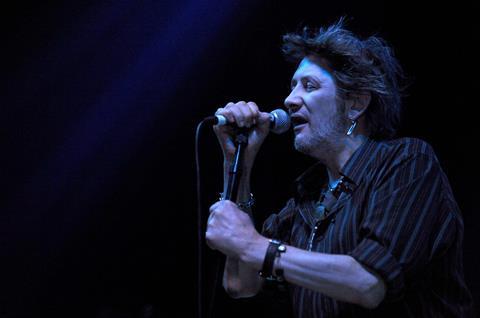
Did you know that Shane MacGowan was born on Christmas Day? I didn’t - until his death last month. How apt for a man whose band, The Pogues, were responsible for ‘Fairytale of New York’, one of the all-time great festive songs.
It’s one of the many notable soundbites to emerge as tributes poured in for a man whose music and life resonated with many – as reflected in the thousands who turned out for his funeral last Friday. Another interesting fact is that, for all its popularity, ‘Fairytale of New York’ has never made it to number one – until this year maybe?
But there’s something else nestled away in the many tributes being paid to the Irish music legend, and that’s numerous references to faith – including how, prior to becoming a punk star, he once considered entering the priesthood.
So, to what extent does faith emerge in the life and work of Shane MacGowan?
“I was brought up to be a religious maniac from an early age,” MacGowan once said of his Catholic background. He gathered with his wider family to pray the rosary and his home was decorated with religious icons. He regularly attended Mass, which he described as “one of the most beautiful experiences a human being can be subjected to.”
Despite the rollercoaster ride as one of Ireland’s most famous artists – including drug and drink abuse, with Sinead O’Connor even calling the police in an attempt to get him off heroin – this upbringing never left him. Indeed, it perhaps meant more to him than is universally acknowledged.
“I always loved the stories of the lives of the saints, and I believe in the saints and always have, I pray to them every day and to Jesus and His Holy Mother,” he told The Catholic Herald.
“I don’t take it for granted that I was born on Christmas Day, Christ’s birthday, and I don’t like that people miss the point of Christmas. It’s not about Santa Claus and presents, it’s supposed to be about the teachings of Christ, who is love. Jesus forgives everyone and we need to practise forgiveness as much as we can. And Jesus teaches peace and love and tolerance, which is what we all need.”
These beliefs fed into his work, with biblical imagery a frequent feature of his song lyrics. In ‘The church of the holy spook’, the opening track of his 1994 post-Pogues solo début, The Snake, he howls: “When the sacred blood of the Holy Ghost is boiling in my veins / I think of Jesus on the cross and I scream out for his pain”. They also inspired his artwork, with one of his drawings offering a take on the Last Supper.
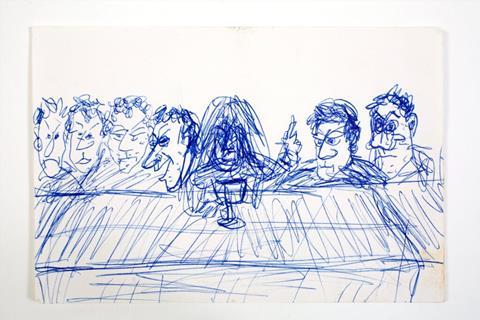
A syncretistic faith
But it wasn’t just Catholicism that resonated with MacGowan.
In A Drink with Shane MacGowan (Pan Books), presented as a conversation between him and his wife, Victoria Clarke, a more syncretistic spirituality emerges. He talks about praying to Buddha as well as God, and even suggests that Jesus’ resurrection was a result of him visiting “the East” and developing Taoist powers.
Clearly, MacGowan’s faith is difficult to pin down, echoing that of his good friend, Nick Cave, who has in recent years returned to church, but stops short of calling himself a Christian. How fascinating it would’ve been to listen in to some of their conversations about faith!
Prior to becoming a punk star, he once considered entering the priesthood
Nonetheless, it seems that Christianity was an important feature of MacGowan’s life – one that he perhaps held onto more dearly in later years. In an Instagram post announcing her husband’s death, Clarke said Shane “has gone to be with Jesus and Mary and his beautiful mother Therese.” At his funeral, held at St Mary of the Rosary Church, Tipperary, Fr Pat Gilbert said MacGowan “had great faith” and received Holy Communion at the church regularly. U2’s Bono, a fellow Irish rockstar and Christian, read from 1 Corinthians 13. Jonny Depp and Bob Geldoff said prayers.
“There but for the grace of God go I”
Last year, MacGowan gave an intriguing interview to The Guardian (the singer’s first interview with a British newspaper in a decade). In the article, journalist Simon Hattenstone reported how religious icons were “crammed” onto MacGowan’s mantelpiece, and the photoshoot shows the musician sporting a huge crucifix.
During their conversation, MacGowan revealed that he and his wife no longer receive many visitors, but a talkative priest comes regularly. The singer admitted losing his faith “a few times” over the years “but never for long”. He refused to elaborate further, but the following night, Hattenstone received a phone call from MacGowan. “I just wanted to know if you have faith,” said the singer. After offering a response, Hattenstone returned the question. “No, I just wanted to know about you,” said MacGowan. “God bless.” The line went dead.
It speaks to the enigma of MacGowan, while shedding further light on a faith that seemed to have depth but was not without doubt and struggle. “I’m very, very aware that there but for the grace of God go I,” he once said.
For him and for ourselves, we can only say: “Amen”.














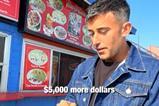
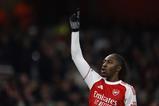
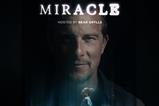





















No comments yet